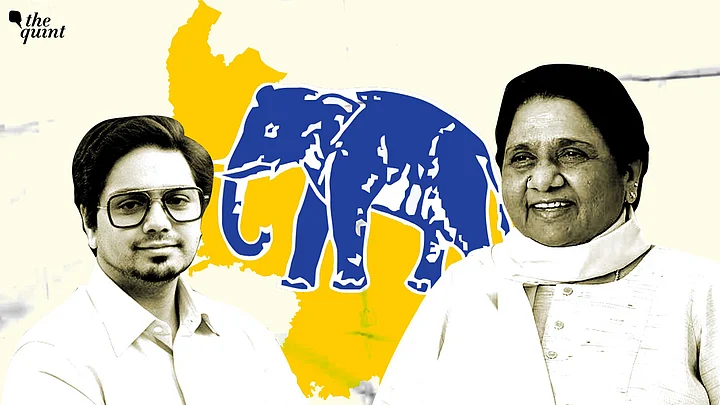Mayawati, the vastly shrunk Dalit behemoth who once promised to change the shape of Indian politics, still has the ability to grab news headlines. She has, somehow, managed to sack her nephew and political successor, Akash Anand, twice in less than a year. It is perhaps the final turn in the suicidal path pursued by Behenji over the past several years to destroy her own party.
The rise and fall of the 30-year-old Dalit leader, dramatically elevated by his aunt as her political successor barely a year ago, is a saga in itself. Anand had swiftly become the Bahujan Samaj Party (BSP) supremo’s favourite after his return from London in 2017 as a 22-year-old business management graduate.
With an eye on the rising challenge from the younger Dalit leader Chandrasekhar Azad, chief of the Bhim Army, Behenji saw Anand as her answer to retaining support among younger Dalits — a segment she feared was slipping away.
Akash Anand was thrust into the political limelight during the 2019 Lok Sabha campaign, where the BSP fought a historic alliance in Uttar Pradesh with the Samajwadi Party (SP) and the Rashtriya Lok Dal (RLD). Although the Bharatiya Janata Party (BJP) swept the polls, the BSP managed to win 10 seats, up from zero in the previous national elections. Shortly afterwards, Mayawati broke the alliance, sparking persistent speculation that she was in secret collusion with the BJP.
From Party Star to Public Sacking
Anand used his business management expertise to modernise BSP operations, helping Mayawati to set up her first X (formerly Twitter) account, which she still uses.
By 2023, he was appointed the youngest-ever national coordinator of the BSP, with wide-ranging responsibilities to oversee the party’s preparations for the Rajasthan, Madhya Pradesh, Telangana and Chhattisgarh Assembly elections.
Despite his efforts, the BSP fared poorly in all these states, losing vote share and seats. However, Behenji sprung a huge surprise in political and media circles when she declared Akash Anand her official political successor. The announcement came at the end of 2023, just months before the 2024 Lok Sabha elections. For a leader who had previously steadfastly refused to name a family or party heir, this was a radical shift.
Energised by the confidence reposed in him by the BSP supremo — who had till then always refused to name her political heir — Anand dived into the Lok Sabha poll campaign last year with tremendous zest.
A fiery orator who did not mince words, the young Dalit leader brought back memories of the aura created in the earlier pioneering political activist career of Behenji, who, in recent years, had lost much the political fire that she had displayed previously. This revived some hope that younger Dalits might return to the BSP fold — especially those drifting towards Chandrasekhar Azad.
However, in a dramatic reversal, Mayawati sacked Anand mid-campaign, after a particularly hard-hitting speech against the BJP.
"This BJP government is a bulldozer government and a government of traitors. The party that leaves its youth hungry and enslaves its elderly is a terrorist government. Taliban runs such a government in Afghanistan."Akash Anand in May 2024
Explaining the public humiliation of her protégé and heir, Behenji said that he had been removed because of his “political immaturity” and promised to review her nephew’s case once he had "proved" that he had grown up.
Not surprisingly, the convulsions within the BSP during the polls was one of the many reasons why it failed to win a single seat in the national elections, while the SP, this time allied with the Congress, staged a major comeback. Anand’s downfall after criticising the BJP only deepened speculation about the saffron party’s hold over Mayawati.
Family Feuds and Future of Dalit Politics
In the aftermath of the elections, Anand was reinstated as national coordinator after issuing a grovelling apology to Mayawati, joined by his father Anand Kumar, Mayawati’s younger brother and long-time trusted aide. Both assured Behenji that Akash would be more cautious in the future.
Unfortunately, this rapprochement seems to have collapsed in less than year with Mayawati once again sacking her nephew and successor — this time citing anti-party activities linked to his father-in-law, Ashok Siddharth, a veteran BSP leader whose father was closely associated with party founder and Dalit messiah Kanshi Ram.
Until recently, Siddharth was quite close to Behenji, who had appointed him to several senior party posts, sent him to the Rajya Sabha, as well gave him her her personal blessings for his daughter Pragya’s marriage to Anand.
His expulsion last month followed his factional feud with another BSP leader, Rajeev Gautam, who is a protégé of Satish Mishra, the influential legal advisor and political confidante. This seems to have sealed the fate of not only Siddharth, but also his son-in-law Anand, who was soon stripped of all status and power in the party, with Behenji declaring, “I will name no successor till I am alive."
There is little doubt that the latest shenanigan within the BSP and the political eclipse of Akash Anand will be a boost to rival Dalit leaders like Chandrasekhar Azad, who are increasingly seen as more credibile options compared to faded, jaded leaders like Mayawati.
Unfortunately, younger leaders like Azad lack both the strategic brilliance of Kanshi Ram or the ruthless tactical sense of Behenji in her prime, when the duo built the BSP into a formidable political force. For now, Dalit politics remains fractured, divided not only between competing leaders but also across sub-castes, without a sense of purpose to stand on its own feet.
(The writer is a Delhi-based senior journalist and the author of ‘Behenji: A Political Biography of Mayawati’. This is an opinion piece. The views expressed above are the author’s own. The Quint neither endorses nor is responsible for the same.)
